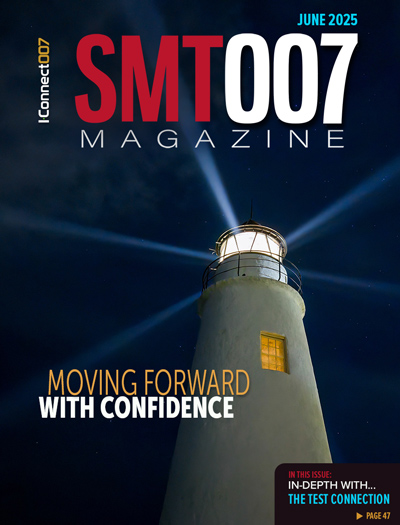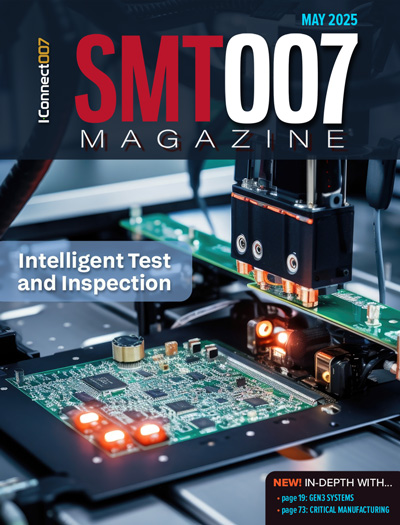-

- News
- Books
Featured Books
- smt007 Magazine
Latest Issues
Current Issue
What's Your Sweet Spot?
Are you in a niche that’s growing or shrinking? Is it time to reassess and refocus? We spotlight companies thriving by redefining or reinforcing their niche. What are their insights?

Moving Forward With Confidence
In this issue, we focus on sales and quoting, workforce training, new IPC leadership in the U.S. and Canada, the effects of tariffs, CFX standards, and much more—all designed to provide perspective as you move through the cloud bank of today's shifting economic market.

Intelligent Test and Inspection
Are you ready to explore the cutting-edge advancements shaping the electronics manufacturing industry? The May 2025 issue of SMT007 Magazine is packed with insights, innovations, and expert perspectives that you won’t want to miss.
- Articles
- Columns
- Links
- Media kit
||| MENU - smt007 Magazine
Dave Hillman on Living Your Passion
March 29, 2022 | Barry Matties, I-Connect007Estimated reading time: 3 minutes
Barry Matties leads this engaging retrospective conversation with Dave Hillman, a Fellow, Materials and Process engineer at Collins Aerospace, who talks about mentorship, pandemic changes, and solder. “Soldering is soldering,” Dave says. “But how we do that keeps evolving in response to the new technologies and smaller packages.” What’s the key to his success and longevity? “Find your passion.” Here’s how he’s done it.
Barry Matties: Dave, you have been in the same position with the same company for nearly 40 years. That type of thing doesn’t even exist anymore.
Dave Hillman: I’ve been really privileged to be able to do so. We have a co-op program at Collins, and I’ve been able to mentor. We get four co-ops a year, two for spring/summer, and then two for summer/fall. About 150 kids to date. A lot of them now are industry colleagues, both in and outside Collins. It’s been fun to watch that transition, to watch them grow, to see the technology changing.
I think it’s interesting how my mentors have always talked about how big a shift it was from plated through-hole to surface mount and how that was revolutionary for the industry. Well, lead-free is doing the same thing. It’s challenging our material sets. What do you do? How do you get there? Collins is one of the few defense contractors that has been building lead-free for 10 years and it’s been very successful. I think the real trick is that we’re engineers. It’s a problem; go solve it.
Matties: Your expertise was in soldering, correct?
Hillman: Correct. I attended Iowa State University for my bachelor’s, then went back 10 or 15 years later for my master’s. I function as the soldering subject matter expert in terms of metallurgy, alloys and processes, troubleshooting, that sort of thing. It’s been a lot of fun. Our industry seems to like to replay the lessons of the past; gold embrittlement is probably this sexiest topic ever on the planet because we just keep talking about it.
Matties: One of the things that we hear constantly is that field defects primarily come down to the solder and solder joints. As an expert, would you validate that statement?
Hillman: I do. If you don’t want defects, it comes down to making sure a design is producible. For instance, why would you have three different product design teams that are using the same part with three different footprints? You don’t need three footprints. You need one footprint because for the manufacturing guys that will be efficiency on their end and uniformity in the solder joints.
As my friend Doug Pauls would say, you can design the most beautiful thing on the planet, but if you can’t build it, what good is it? This industry no longer designs something, then throws it over the wall. Nowadays, the design teams and the manufacturing teams are very much connected.
Matties: With the soldering process, there are a lot of ways it can go wrong.
Hillman: I think it’s interesting that we had this huge drive for “just in time,” “no WIP,” and “keep your inventory low.” Then COVID hits and suddenly we don’t have anything in stock. We have no security backup. That “just in time” philosophy works when things are coming together as planned. I think we all underrated how critical it is to a process.
Matties: We’re seeing a new trend in how we’re melting solder as opposed to the traditional reflow processes. How do you view these new technologies in terms of market acceptability and performance?
Hillman: I remember my mentors telling me early in my career, “Here’s the wave solder machine, but don’t pay much attention to it. It’ll be gone in about five, six years. We’re not using it very much.” Yet, we still have wave solder. Our soldering processes have evolved to deliver what’s needed.
To read this entire conversation, which appeared in the March 2022 issue of SMT007 Magazine, click here.
Suggested Items
Driving Innovation: Direct Imaging vs. Conventional Exposure
07/01/2025 | Simon Khesin -- Column: Driving InnovationMy first camera used Kodak film. I even experimented with developing photos in the bathroom, though I usually dropped the film off at a Kodak center and received the prints two weeks later, only to discover that some images were out of focus or poorly framed. Today, every smartphone contains a high-quality camera capable of producing stunning images instantly.
Hands-On Demos Now Available for Apollo Seiko’s EF and AF Selective Soldering Lines
06/30/2025 | Apollo SeikoApollo Seiko, a leading innovator in soldering technology, is excited to spotlight its expanded lineup of EF and AF Series Selective Soldering Systems, now available for live demonstrations in its newly dedicated demo room.
Indium Corporation Expert to Present on Automotive and Industrial Solder Bonding Solutions at Global Electronics Association Workshop
06/26/2025 | IndiumIndium Corporation Principal Engineer, Advanced Materials, Andy Mackie, Ph.D., MSc, will deliver a technical presentation on innovative solder bonding solutions for automotive and industrial applications at the Global Electronics A
Fresh PCB Concepts: Assembly Challenges with Micro Components and Standard Solder Mask Practices
06/26/2025 | Team NCAB -- Column: Fresh PCB ConceptsMicro components have redefined what is possible in PCB design. With package sizes like 01005 and 0201 becoming more common in high-density layouts, designers are now expected to pack more performance into smaller spaces than ever before. While these advancements support miniaturization and functionality, they introduce new assembly challenges, particularly with traditional solder mask and legend application processes.
Knocking Down the Bone Pile: Tin Whisker Mitigation in Aerospace Applications, Part 3
06/25/2025 | Nash Bell -- Column: Knocking Down the Bone PileTin whiskers are slender, hair-like metallic growths that can develop on the surface of tin-plated electronic components. Typically measuring a few micrometers in diameter and growing several millimeters in length, they form through an electrochemical process influenced by environmental factors such as temperature variations, mechanical or compressive stress, and the aging of solder alloys.


